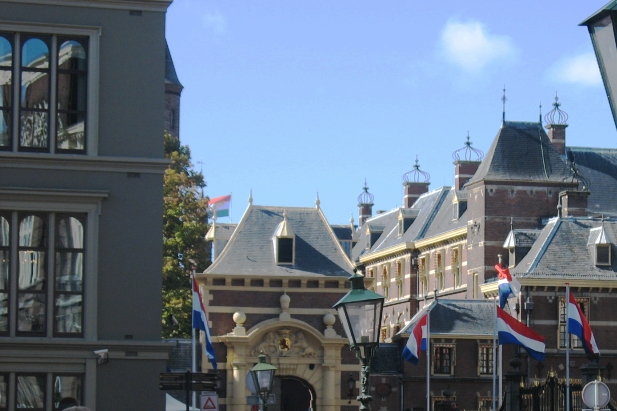


| |
The city of The Hague, South Holland     |  |  |
The Hague Short Information Sheet:
| Country: Netherlands
Province: South Holland
Population city (estimate): 475,000
Population agglomeration (estimate): 600,500
The Hague was founded in 1248 by William II, Count of Holland. The city is called in Dutch "Den Haag", and is officially also called "'s-Gravenhage" (literally "The Count's Hedge"). It is the third-largest city in the Netherlands after Amsterdam and Rotterdam, and it is the actual seat of government.
The Hague is the home of the Eerste Kamer (first chamber) and the Tweede Kamer (second chamber), respectively the upper and lower houses forming the Staten Generaal (literally the "Estates-General").
Queen Beatrix of the Netherlands lives and works in The Hague. All foreign embassies and government ministries are located in the city, as well as the Hoge Raad der Nederlanden (The Supreme Court), the Raad van State (Council of State). |
The Hague Information Cloud:
|
|
|
The Hague (Den Haag, also 's-Gravenhage) is the third city in the Netherlands after Amsterdam and Rotterdam, with a population of about 475,000. The ciy is located in the west of the Netherlands, in the province of South Holland. The Hague is the capital of the province South Holland and the actual seat of government.
The Hague is the home of the Eerste Kamer (first chamber) and the Tweede Kamer (second chamber), respectively the upper and lower houses forming the Staten Generaal (literally the "Estates-General"). Queen Beatrix of the Netherlands lives and works in The Hague. All foreign embassies and government ministries are located in the city, as well as the Hoge Raad der Nederlanden (The Supreme Court), the Raad van State (Council of State) and many lobbying organisations.
The Hague was founded in 1248 by William II, Count of Holland and Rex Romanorum, who was supposed to become Holy Roman Emperor. He started the construction of a castle in a forest near the sea in Holland, where he intended to live after his coronation. He died in battle before he could be crowned. His castle was not finished, but parts of it remain and are now called the Ridderzaal (Knights' Hall). It is still in use for political events, such as the annual speech from the throne by the monarch.
Later, the counts of Holland used The Hague as their administrative centre. 'Des Graven Hage' literally means "the count's hedge" or "the count's private enclosure". The powerful cities of Holland, like Leiden, Delft, and Dordrecht, struck a compromise to choose the then small and unimportant village of The Hague as their administrative centre. This policy was never changed, and The Hague is to this day the center of government but not the official capital.
To keep The Hague small, it was not allowed city rights or allowed to build city walls. When city walls were finally allowed in the 1500s, the population decided to use the money to build a city hall instead of city walls. This proved disastrous during the Eighty Years' War, as it allowed Spanish troops to easily occupy the town.
| |
|















